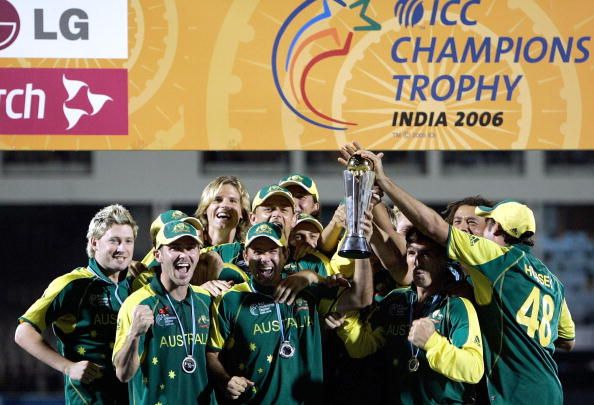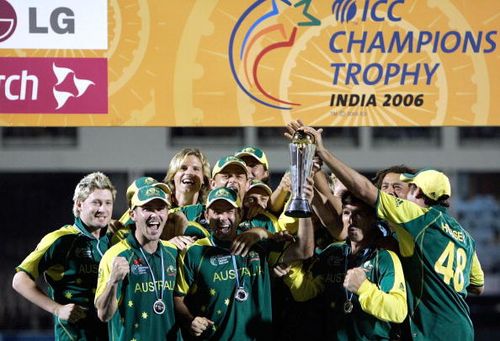
ICC Champions Trophy 2006 flashback: The invincible Aussies complete their trophy collection

Mumbai, India: Australian cricketers celebrate as they pose with The ICC Champions Trophy 2006 following a trophy presentation at The Brabourne Stadium in Mumbai, 05 November 2006.
Sticking to its bi-yearly plan, the Champions Trophy made its fifth appearance in 2006 and now the entourage had moved to India. With the international schedule getting tighter by the day and the tournament serving no real purpose, murmurs of dropping it altogether had gathered pace.
Like most ICC events, this event too had its share of troubles. Apart from the usual terror concern, which by then had become commonplace in the subcontinent, there was also a tax-related issue which had to be sorted with the Indian government before the tournament.
Many raised questions about the timing of the event as well, as it was being held barely five months before the 2007 World Cup in the West Indies. Also, with the tournament taking place in October, right at the tail of the monsoon season in India, there were worries regarding the pitch behaviour, which eventually came true.
The ICC, in a bid to keep the event competitive, decided to expel the associate nations from the tournament and trim the number of participants to just eight. The top six seeded teams made a direct entry to the tournament, while the defending champions West Indies, Sri Lanka, Zimbabwe and Bangladesh fought for the final two spots in a pre-tournament qualifying round.
Qualifiers
The qualifiers produced a slew of one-sided games and, to no one’s surprise, Sri Lanka and West Indies made it through to the main leg of the tournament. Victory margins of 37 runs, 9 wickets, 144 runs, 10 wickets, 101 runs and 9 wickets show how lop-sided the contests were. With the home side not in picture and some substandard cricket on display, the turnout for these games were very low, especially considering that it was in India.
Group Stages
The eight teams were divided into two groups of four teams, with the top two teams from each group qualifying for the semis.
Group A, which had Australia, India, England and West Indies, started off on expected lines with the hosts brushing aside England by 4 wickets in Jaipur. Asked to bat first, the Englishmen were unable to negotiate the early movement generated by the Indian seamers and folded up for just 126. Even though they managed to pick up six Indian wickets and create a bit of flutter in the opposition camp, the result of the game was never in doubt.
Things, however, didn’t go according to the script as the West Indies defeated Australia and India to produce back-to-back upsets in the group. Batting first on a sluggish wicket at the Brabourne Stadium in Mumbai, the Caribbean team rode on half centuries by Runako Morton and skipper Brain Lara to post a competitive 234/6. In reply, Australia got off to a good start courtesy Adam Gilchrist, but some brilliant bowling in the later half of the innings by Jerome Taylor helped the defending champions pull off a 10-run victory.
A week later, the Windies bowling came good again as they registered another narrow win, by 3 wickets this time, against India at Ahmedabad. Having restricted the home team’s mighty batting lineup to 223/9, Shivnarine Chanderpaul and Ramnaresh Sarwan led the way with the bat to sneak past India’s total in the last over. It was a winner-take-all affair between India and Australia at Mohali in the final group A encounter in which a composed unbeaten 73 by Damien Martyn ended the tournament for the hosts.
The unfancied New Zealand side kicked off group B with a surprise 87-run victory over South Africa in Mumbai. Having been bowled out for 195, the Kiwis rallied to stage a stunning comeback and skittled out the Proteas for 108. They were aided by the under-prepared pitch which disintegrated, making batting almost impossible during the chase.
It was business as usual for Pakistan, who arrived with several off-field issues. With the regular skipper Inzamam Ul-Haq still serving his ban for The Oval Test fiasco, the captaincy baton moved to and fro between Younis Khan and Mohammad Yousuf before settling with Younis. Things got worse as their new ball bowlers, Shoaib Akhtar and Mohammad Asif, were sent home after failing a drug test.
On the field, they got off to good start with a 4-wicket win over Sri Lanka at Jaipur, but struggled against New Zealand and South Africa at Mohali on a pitch which provided substantial bounce and lateral movement for the seamers. In their final game, they had South Africa reeling at 45/5, but allowed them to recover to 213/8 before getting bundled out for just 89. The Sri Lankans too found the Proteas attack too hot to handle, and their ouster from the event meant that, for the first time since the 1975 World Cup, there was no Asian team in the knockout stages of an ICC event.